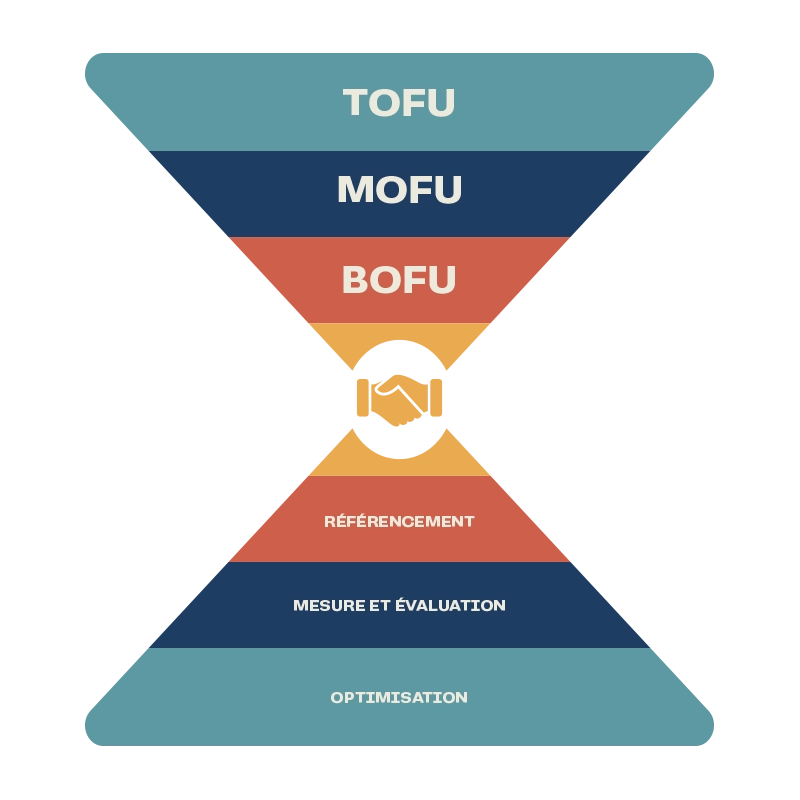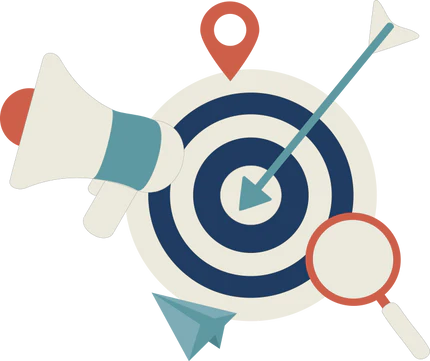
Turn your data into a growth engine
Conversion tracking and data analysis are at the heart of a successful digital marketing strategy. Now, with the disappearance of third-party cookies and the introduction of regulations such as Law 25 and GDPR, businesses must rethink how they collect, analyze, and use data.
At Bofu, we integrate advanced analytics solutions to ensure accurate tracking of interactions and performance, enabling us to optimize marketing campaigns, improve ad targeting, and deliver an enriched customer experience.
We offer comprehensive conversion tracking support, from tool implementation to in-depth data analysis, to ensure that every touchpoint with your customers actively contributes to your business success.
Need an audit of your analytical monitoring?
Why is conversion tracking essential for an omnichannel strategy?
An omnichannel approach to digital marketing relies on intelligent data mining. Well-structured conversion tracking allows you to accurately measure user actions and optimize each performance lever.
Bofu helps you optimize your data architecture to transform your insights into strategic decisions and ensure reliable monitoring in a constantly evolving digital environment. Get a personalized consultation to structure your conversion tracking.
Our tools and technologies for efficient analytical monitoring
We integrate and optimize the best tracking tools to ensure efficient and regulatory-compliant data collection.

Google Tag Manager (GTM)
Centralized tag management for flexible and scalable tracking.

Google Analytics 4 (GA4)
Advanced user behavior tracking, cross-device analysis and conversion modeling.
Google Ads & Meta Pixel
Conversion attribution and advertising performance optimization.

LinkedIn Insight Tag & Microsoft Clarity
User journey analysis and performance monitoring in B2B.
Google Looker Studio
Dynamic dashboards for real-time data visualization.

CRM & Third-Party Integrations
Connecting customer data for a seamless omnichannel approach.
Our team handles the installation, configuration, and optimization of these tools , ensuring accurate tracking of your campaign interactions and performance. Looking to implement an advanced tracking system?

Primary Conversions: Actions that directly impact revenue
These conversions are the most important success indicators for a business. They correspond to the ultimate goals and allow for a direct measurement of the return on investment of marketing campaigns.
• In e-commerce : Online purchases, completed transactions, in-store visits attributed to digital campaigns.
• In lead generation : Contact forms submitted, phone calls generated by campaigns, registrations for a service.
Accurate monitoring of these conversions is essential to evaluate the effectiveness of the strategies implemented and identify growth levers.
Secondary Conversions: Intent and Advanced Engagement Signals
Secondary conversions help gauge users' level of interest and engagement before they take the final action.
• In e-commerce : Adding to cart, subscribing to a stock alert, repeated consultation of a product.
• In lead generation : Downloading a case study, subscribing to a newsletter, participating in a webinar.
They are crucial for fueling remarketing strategies and maximizing conversion chances.
Third-party conversions: behavioral and interest signals
These interactions indicate a nascent interest in your brand and allow you to tailor the user experience to reinforce purchase or engagement intent.
• In e-commerce : Consulting customer reviews, watching a product video, exploring technical sheets.
• In lead generation : Time spent on a strategic page, repeated clicks on an action button, engagement on the blog or social networks.
Thanks to an advanced segmentation strategy , we help you structure and analyze this data to refine your campaigns and improve your conversion rates.
Need support to optimize your analytical monitoring?
Compliance and adaptation to new data regulations
With the implementation of Law 25, the GDPR, and the gradual disappearance of third-party cookies , companies must rethink their data collection. Inadequate tracking can lead to a loss of visibility into marketing performance and a reduction in growth opportunities.
How do we help you navigate these changes?
Our solutions guarantee precise, secure performance monitoring that complies with new regulations .
Ensure the sustainability of your analytical monitoring by booking a consultation.
Why choose Bofu to structure your conversion tracking?
An integrated omnichannel approach
which connects analytics, digital advertising, SEO and automation for a 360 view of performance.
Advanced expertise in digital performance marketing,
combining technology and strategy to maximize campaign profitability.
Solutions adapted to new regulations
to ensure sustainable data collection and analysis.
Strategic and technical support
to ensure an efficient and scalable implementation.
With a proven methodology and cutting-edge tools , we enable your business to fully harness the power of your data to maximize your marketing results.
Ready to structure your data and improve your conversion tracking?
Analytics and Conversion Tracking
Conversion tracking is a process for measuring key actions taken by users on a website or app. This includes purchases, form submissions, phone calls, registrations, and other important interactions. It helps evaluate the effectiveness of marketing campaigns and optimize advertising performance.
A well-defined structure allows for precise analysis of the customer journey, identification of friction points in the conversion funnel, and optimization of advertising campaigns. Effective tracking improves targeting, segmentation, and the return on investment (ROI) of marketing actions.
Key tracking tools include:
• Google Analytics 4 (GA4) for behavioral analysis and event measurement.
• Google Tag Manager (GTM) for centralized management of tracking tags.
• Google Ads and Meta Pixel for tracking advertising performance.
• Looker Studio for creating dashboards and analyzing real-time data.
• CRM and third-party tools for better integration of customer data.
Primary Conversions : Actions that have a direct impact on revenue (online purchase, form submission, phone call).
• Secondary Conversions : Advanced engagement signals (add to cart, download a guide, watch a key video).
• Third-party conversions : General interest indicators (time spent on the site, clicks on a CTA without final action, consultation of customer reviews).
These regulations strengthen personal data protection and limit the use of third-party cookies, making conversion tracking more complex. To adapt, it's essential to implement alternative solutions such as:
• Tracking based on first-party data via CRM and forms.
• Server-side tracking to reduce reliance on third-party cookies.
• Conversion modeling via Google and Meta to fill data losses.
• Define clear conversion goals and segment them into levels of importance.
• Correctly configure monitoring tools and ensure the quality of the data collected.
• Integrate analytics into omnichannel strategies (SEO, paid advertising, automation, CRM).
• Use custom dashboards for real-time analysis and quick adjustments.
• GA4 is based on an event-driven model, providing more advanced analysis of user interactions.
• Universal Analytics (UA) is based on sessions and page views, a model that is now obsolete.
• GA4 enables more precise cross-device tracking and better integrates new data confidentiality constraints.
Server-side tracking involves sending conversion data through an intermediary server rather than directly through the browser. This allows you to:
• Reduce data loss due to cookie blockers.
• Improve the accuracy of conversion tracking.
• Ensure better compliance with privacy regulations.
• Use attribution models (last-click, multi-touch, data-driven) to better understand the contributions of each channel.
• Compare campaign performance across analytics and advertising platforms.
•Integrate dynamic reporting tools like Looker Studio for clear visualization of KPIs.
We offer a complete service including:
• Audit and diagnosis of your current monitoring.
• Implementation and configuration of analytical tools.
• Data structuring and conversion segmentation.
• Continuous optimization to maximize marketing performance and ROI.
A check can be performed using tools like Google Tag Assistant, Meta Pixel Helper, and GA4 or Google Ads debug reports. A technical audit can also be performed by Bofu to identify and correct configuration errors.
It reduces the ability to track users across multiple sessions and devices. To counter this, companies must strengthen their first-party data collection and adopt server-side tracking solutions.
• Define a clear nomenclature of events and conversion objectives.
• Centralize tag management via Google Tag Manager.
• Regularly validate the quality of the data collected.
Yes, there are other solutions like Matomo, Adobe Analytics, or integrated CRM tools like HubSpot, but GA4 remains one of the most comprehensive and accessible solutions.
Specific integrations with Google Ads, Meta and CRMs allow you to import offline conversions to link digital actions to physical sales or direct interactions.
• Last Click : Total credit given to the last point of contact before conversion.
• First Click : All credit goes to the first point of contact.
• Linear : Each point of contact receives an equal share.
• Data-driven : Attribution based on algorithms and analysis of interactions.
A goal measures a specific interaction configured as a success (e.g., time spent on a page), while a conversion is a more meaningful action leading directly to a business outcome (e.g., purchase, form submitted).
Yes, GA4 and Facebook Conversion API allow cross-device tracking by associating unique identifiers with users when they interact across devices.
It's essential to apply filters and conditions in GA4 and Google Ads, verify tags via GTM, and use solutions like server-side tracking to limit multiple records of the same conversion.
Conversion tracking should be linked to ad campaigns, SEO, email automation, CRM, and content strategies to enable comprehensive analysis and more effective decision-making.














